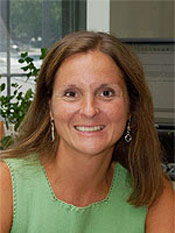Kim Shinew
Professor
Recreation, Sport and Tourism

Kim Shinew's research addresses relationships between leisure practices and cultural diversity. Under her mentorship, her
doctoral students have investigated the impact of fibromyalgia on women’s daily living and leisure, the role of body image in
choices about exercising, the impact of disability on negotiating workplace friendships, and how infertility affects leisure choices.
Working closely with park districts in the Chicago area, Dr. Shinew has been examining boundary issues between different racial and
ethnic groups. "Parks often become quite segregated," she said. "If people are segregating during their leisure time because they
choose to, that's one thing. But if they segregate because they don't feel welcome, that's quite another, and it's a really fine
line to figure out." Often, she added, the behaviors are so ingrained that people may not even know why they engage in them.
"It's just an innate feeling from what they've grown up with–'I'm not welcome in those places; therefore, I don't prefer to
go to those places,'" she said. She will continue to try to tease out these complex issues in the future.
Her recent research, done in collaboration with RST colleague Monika Stodolska, has focused on Little Village, a predominantly
Latino neighborhood in Chicago. They recently published a study in Leisure Science examining the use of park facilities in that
and the East Side neighborhoods, and found that the presence of gangs in the parks discouraged their use by neighborhood residents,
who perceived the parks as unsafe. In a larger study of factors addressing the quality of life of Little Village residents, Drs.
Shinew and Stodolska found that things such as environmental degradation, insufficient access to open spaces, a low sense of
community, fear of crime, and the undocumented status of many residents adversely affected the community’s quality of life.
Last fall, they initiated a study among Little Village middle and high school students of the relationship between perceptions
of their neighborhood and physical activity.
Working within a field in which it is commonly accepted that exercise and leisure activity carries many benefits, Dr. Shinew
said it is also important to identify that some of the obstacles people face, such as fear of violence in parks and recreational
facilities, are seemingly insurmountable. She is a strong believer in translational research. "Any time my research can inform
practitioners about ways to better serve marginalized populations, I feel that it's worthwhile," she said. "I think the greatest
contribution I've made is disseminating my research findings to audiences that can actually use that information."